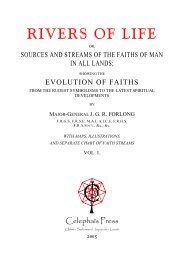Dutch Fairy Tales by William Elliot Griffis.pdf
Dutch Fairy Tales by William Elliot Griffis.pdf
Dutch Fairy Tales by William Elliot Griffis.pdf
You also want an ePaper? Increase the reach of your titles
YUMPU automatically turns print PDFs into web optimized ePapers that Google loves.
[Illustration: WHICH WAS THE MORE GLORIOUS, HER LONG TRESSES OR THE SHINING CROWN<br />
ABOVE.]<br />
The singer from the south sang a new song, and when he played upon his harp his music was apt to be soft<br />
and low; sometimes sad, even, and often appealing. It was so much finer, and oh! so different, from what the<br />
glee men and harpers in the king's court usually rendered for the listening warriors. Instead of being about<br />
fighting and battle, or the hunting of wolves and bears, of stags and the aurochs, it was of healing the sick and<br />
helping the weak. In place of battles and the exploits of war lords, in fighting and killing Danes, the harper's<br />
whole story was of other things and about gentle people. He sang neither of war, nor of the chase, nor of<br />
fighting gods, nor of the storm maidens, that carry up to the sky, and into the hall of Woden, the souls of the<br />
slain on the battlefield.<br />
The singer sang of the loving Father in Heaven, who sent his dear Son to earth to live and die, that men might<br />
be saved. He made music with voice and instrument about love, and hope, and kindness to the sick and poor,<br />
of charity to widows and to orphans, and about the delights of doing good. He closed <strong>by</strong> telling the story of<br />
the crown of thorns, how wicked men nailed this good prophet to a cross, and how, when tender−hearted<br />
women wept, the Holy Teacher told them not to weep for him, but for themselves and their children. This<br />
mighty lord of noble thoughts and words lived what he taught. He showed greatness in the hour of death, <strong>by</strong><br />
first remembering his mother, and then <strong>by</strong> forgiving his enemies.<br />
“What! forgive an enemy? Forgive even the Danes? What horrible doctrine do we hear!” cried the men of<br />
war. “Let us kill this singer from the south.” And they beat their swords on their metal shields, till the clangor<br />
was deafening. The great hall rang with echoes of the din, as if for battle. The Druids, or pagan priests, even<br />
more angry, applauded the action of the fighting men.<br />
But Fos−te−di−na rushed forward to shield the harper, and her long golden hair covered him.<br />
“No!” said the king to his warriors. “This man is my guest. I invited him and he shall be safe here.”<br />
Sullen and bitter in their hearts, both priests and war men left the hall, breathing out revenge and feeling<br />
bound to kill the singer. Soon all were quiet in slumber, for the hour was late.<br />
Why were the pagan followers of the king so angry with the singer?<br />
The answer to this question is a story in itself.<br />
<strong>Dutch</strong> <strong>Fairy</strong> <strong>Tales</strong> for Young Folks<br />
Only three days before, a party of Christian Danes had been taken prisoners in the forest. They had come,<br />
peaceably and without arms, into the country; for they wanted to tell the Frisians about the new religion,<br />
which they had themselves received. In the cold night air, they had, unwittingly, cut off some of the dead<br />
branches of a tree sacred to the god Fos−i−te to kindle a fire.<br />
A spy, who had closely watched them, ran and told his chief. Now, the Christian Danes were prisoners and<br />
would be given to the hungry wolves to be torn to pieces. That was the law concerning sacrilege against the<br />
trees of the gods.<br />
Some of the Frisians had been to Rome, the Eternal City, and had there learned, from the cruel Romans, how<br />
to build great enclosures, not of stone but of wood. Here, on holidays, they gave their prisoners of war to the<br />
wild beasts, for the amusement of thousands of the people. The Frisians could get no lions or tigers, for these<br />
fierce brutes live in hot countries; but they sent hundreds of hunters into the woods for many miles around.<br />
These bold fellows drove the deer, bears, wolves, and the aurochs within an ever narrowing circle towards the<br />
pits. Into these, dug deep in the ground and covered with branches and leaves, the animals fell down and were<br />
THE GOLDEN HELMET 60






![[PDF] Prolegomena](https://img.yumpu.com/16774951/1/190x245/pdf-prolegomena.jpg?quality=85)









